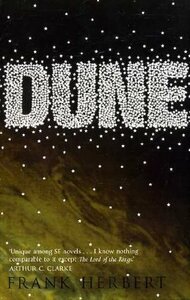You need to sign in or sign up before continuing.
Take a photo of a barcode or cover
adventurous
challenging
informative
inspiring
reflective
tense
medium-paced
Plot or Character Driven:
A mix
Strong character development:
Yes
Loveable characters:
Yes
Diverse cast of characters:
Yes
Flaws of characters a main focus:
Yes
10/10, A cornerstone of Science Fiction and a masterpiece of the medium.
A grand world, engaging characters, and a war of factions the likes of which I never imagined going in.
Everything is described perfectly, it doesn't intrude, nor drag out the story, it just describes perfectly.
My only (and very slight) gripe is that the second part feels like it drags a bit in the middle, adding to, but not necessarily expanding the Fremen culture.
I watched the movie after I had finished about half the book (where the first movie ends), it is great, and incredibly pretty, but it couldn't quite translate the depths of the politics, if you have watched the movie, definitely give this a read, the first book at least.
It's astounding how much Star Wars copies from this and the Foundation series, it really is the mass market spiritual successor.
A grand world, engaging characters, and a war of factions the likes of which I never imagined going in.
Everything is described perfectly, it doesn't intrude, nor drag out the story, it just describes perfectly.
My only (and very slight) gripe is that the second part feels like it drags a bit in the middle, adding to, but not necessarily expanding the Fremen culture.
I watched the movie after I had finished about half the book (where the first movie ends), it is great, and incredibly pretty, but it couldn't quite translate the depths of the politics, if you have watched the movie, definitely give this a read, the first book at least.
It's astounding how much Star Wars copies from this and the Foundation series, it really is the mass market spiritual successor.
adventurous
dark
medium-paced
Plot or Character Driven:
A mix
Strong character development:
Yes
Loveable characters:
N/A
Diverse cast of characters:
Yes
Flaws of characters a main focus:
N/A
adventurous
mysterious
medium-paced
Plot or Character Driven:
Character
Strong character development:
Yes
Loveable characters:
Complicated
Diverse cast of characters:
Yes
Flaws of characters a main focus:
Complicated
adventurous
reflective
medium-paced
Plot or Character Driven:
Character
Strong character development:
Yes
Loveable characters:
Yes
Diverse cast of characters:
Yes
Flaws of characters a main focus:
Yes
tense
medium-paced
Plot or Character Driven:
A mix
Strong character development:
Yes
Loveable characters:
Yes
adventurous
challenging
mysterious
tense
slow-paced
Plot or Character Driven:
A mix
Strong character development:
Yes
Loveable characters:
Yes
Diverse cast of characters:
Yes
Flaws of characters a main focus:
Yes
I tend to read books before watching the film adaptations but I did the opposite with Dune and think this worked well. I'm not sure what my experience would have been if I didn't have the understanding from the films already, a lot of this book is telling the reader what is happening without explaining a lot. Regardless I enjoyed this book a lot and really liked the differences I already knew of from the film, so it made the book a great new experience for me. Excited to continue the series.
My husband made a deal with me: I read his favorite book if he reads mine. Well, I read his Dune book and I wasn't expecting to enjoy it as much as I did!
There's a lot I didn't understand just because I wasn't really familiar with the world outside of the movie franchise, but my husband knows all in the Dune-iverse so he helped pick up the pieces I didn't know. I will say, there's quite a bit of this book that was similar if not the same to the movies, but I was surprised at the depth of the book compared to the movie. I saw way more in the book than the movies showed, mostly having to do with the mental aspect of the Mother. I don't quite understand the religion aspect either. Still really good!
There's a lot I didn't understand just because I wasn't really familiar with the world outside of the movie franchise, but my husband knows all in the Dune-iverse so he helped pick up the pieces I didn't know. I will say, there's quite a bit of this book that was similar if not the same to the movies, but I was surprised at the depth of the book compared to the movie. I saw way more in the book than the movies showed, mostly having to do with the mental aspect of the Mother. I don't quite understand the religion aspect either. Still really good!
adventurous
challenging
mysterious
fast-paced
Plot or Character Driven:
A mix
Strong character development:
Complicated
Loveable characters:
Complicated
Diverse cast of characters:
Yes
Flaws of characters a main focus:
Complicated
adventurous
challenging
slow-paced
Plot or Character Driven:
A mix
Strong character development:
Yes
Loveable characters:
No
Diverse cast of characters:
No
Flaws of characters a main focus:
Yes
adventurous
medium-paced
Plot or Character Driven:
A mix
Strong character development:
Yes
Loveable characters:
Yes
Diverse cast of characters:
Yes
Flaws of characters a main focus:
Complicated







